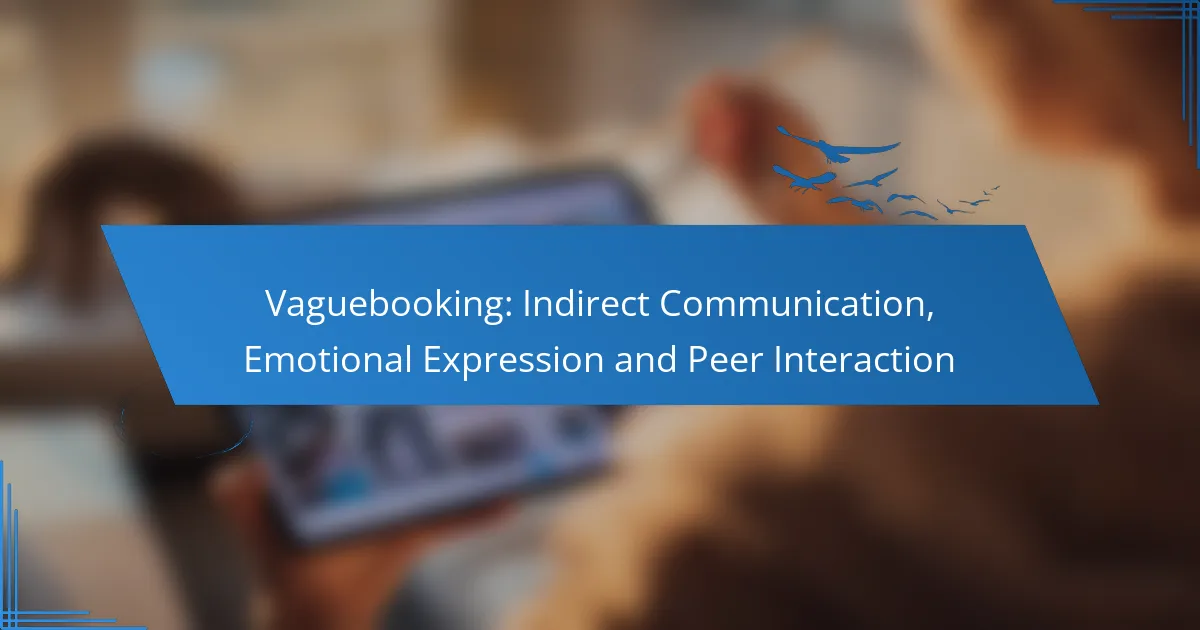Vaguebooking, the act of sharing ambiguous messages on social media, plays a significant role in emotional expression and peer interaction, particularly among Canadians. This practice allows users to convey their feelings without revealing specific details, often leading to increased curiosity and concern from their audience. However, it can also contribute to anxiety and loneliness for the individual posting, highlighting the need for more direct communication to foster healthier online relationships.

How does vaguebooking impact emotional expression in Canada?
Vaguebooking, the practice of posting ambiguous or unclear messages on social media, significantly influences emotional expression among Canadians. It allows individuals to share feelings without disclosing specific details, fostering a unique form of communication that can evoke curiosity and concern from peers.
Facilitates indirect communication
Vaguebooking enables users to express their emotions indirectly, often leading to discussions that might not occur otherwise. For example, a post like “Feeling overwhelmed today” invites friends to inquire further without the poster having to reveal personal struggles. This indirect approach can create a sense of safety for those hesitant to share openly.
However, this method can lead to misunderstandings, as the lack of clarity may cause friends to misinterpret the poster’s feelings. It’s essential for users to balance the need for privacy with the potential for confusion.
Encourages peer support
By posting vague messages, individuals often receive supportive responses from their peers, which can be comforting. Friends may offer encouragement or check in, creating a network of emotional support. This interaction can be particularly beneficial in a culture like Canada’s, where community and social bonds are valued.
Nonetheless, it’s important for users to recognize that not all vague posts will elicit the desired response. Some friends may feel unsure about how to react, leading to silence instead of support. Clearer communication, when possible, can enhance the effectiveness of peer support.
Creates shared experiences
Vaguebooking can foster a sense of shared experiences among users, as many may relate to the emotions expressed, even if the details are unclear. This commonality can strengthen social ties and create a feeling of belonging within online communities. For instance, a vague post about “a tough week” may resonate with others who have faced similar challenges.
However, it’s crucial to remember that while shared experiences can unite, they can also lead to superficial connections if users rely too heavily on vague expressions. Engaging in more direct conversations can deepen these relationships and enhance mutual understanding.
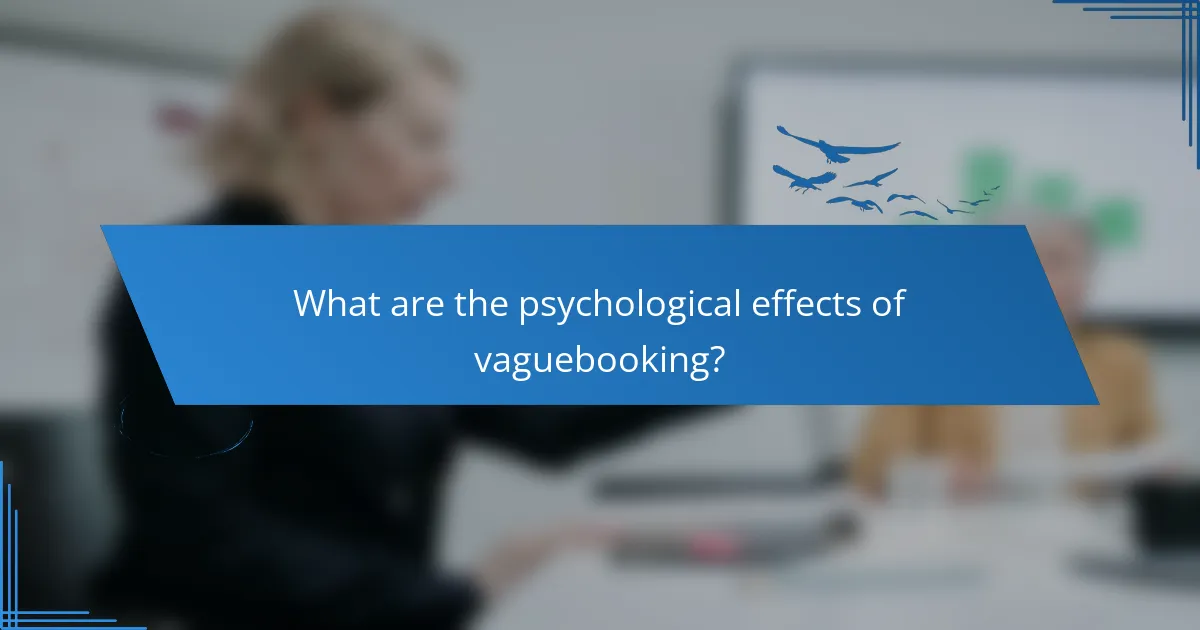
What are the psychological effects of vaguebooking?
The psychological effects of vaguebooking include increased anxiety and curiosity among peers, as well as heightened feelings of loneliness for the individual posting. This indirect form of communication often leaves friends and followers guessing about the poster’s emotional state, which can lead to negative mental health outcomes.
Increases anxiety and curiosity
Vaguebooking can create a sense of anxiety and curiosity among friends and followers. When someone posts ambiguous statements or emotions, it prompts others to speculate about the underlying issues, leading to heightened concern or worry.
This uncertainty can result in a cycle of anxiety, where individuals feel compelled to reach out for clarification but may also fear overstepping boundaries. The lack of clear communication can exacerbate feelings of unease, both for the poster and their audience.
Enhances feelings of loneliness
Engaging in vaguebooking can ironically increase feelings of loneliness for the individual posting. While the intention may be to seek support or connection, the indirect nature of the communication often fails to elicit the desired response.
Instead of receiving direct support, the poster may find themselves isolated, as friends may not know how to respond appropriately. This disconnect can lead to a sense of alienation, reinforcing the very emotions the person sought to express.
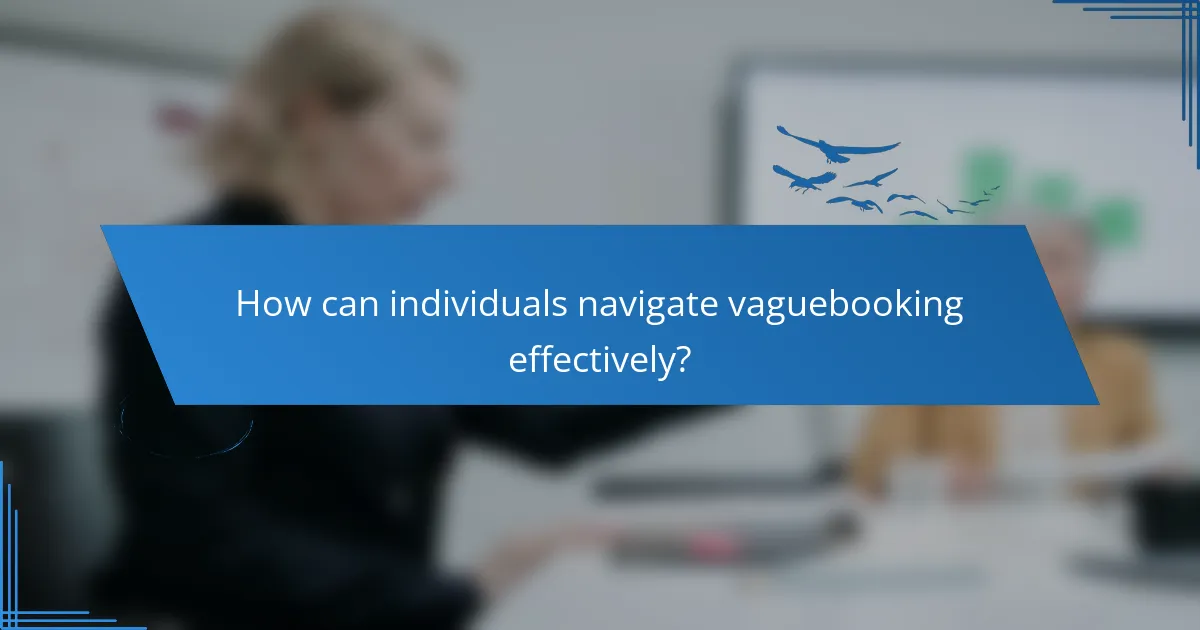
How can individuals navigate vaguebooking effectively?
Individuals can navigate vaguebooking effectively by being clear about their intentions and opting for direct communication when necessary. This approach minimizes misunderstandings and fosters healthier interactions online.
Clarify intentions before posting
Before sharing a vague post, take a moment to reflect on your intentions. Are you seeking support, venting frustration, or simply looking for attention? Understanding your purpose can help you craft a message that resonates more clearly with your audience.
Consider the potential impact of your words on your friends and followers. If your post is meant to elicit concern or curiosity, be prepared for varied responses. A well-defined intention can prevent confusion and ensure that your message is received as intended.
Engage in direct communication
When vaguebooking leads to misunderstandings, consider reaching out to friends directly. A private message or phone call can clarify your feelings and intentions without the ambiguity of a public post. This approach often fosters deeper connections and more meaningful conversations.
Encourage your peers to do the same. If you find a post unclear, ask the author for more context rather than making assumptions. This practice not only strengthens relationships but also promotes a culture of open dialogue among your social circle.
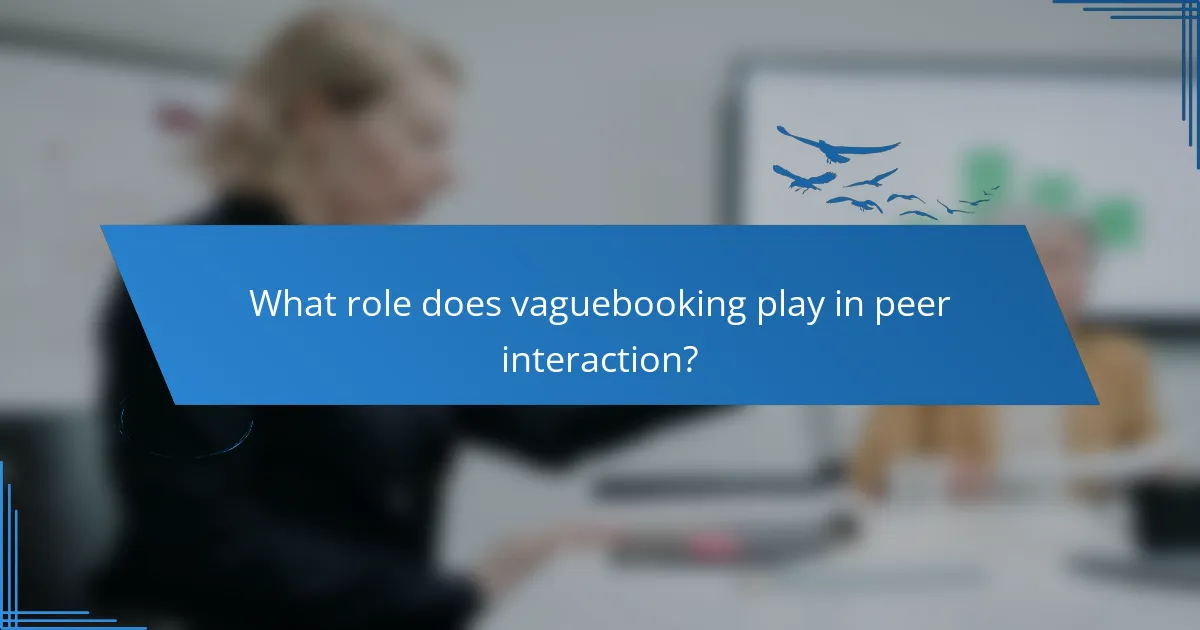
What role does vaguebooking play in peer interaction?
Vaguebooking serves as a tool for indirect communication among peers, allowing individuals to express emotions or thoughts without providing explicit details. This form of interaction can create intrigue and prompt responses, fostering engagement within social circles.
Strengthens social bonds
Vaguebooking can enhance social connections by inviting friends to inquire about the poster’s feelings or experiences. This interaction often leads to deeper conversations, as peers feel encouraged to share their own thoughts and support each other.
For example, a post like “Feeling overwhelmed today” may elicit comments from friends offering encouragement or asking what’s wrong. This exchange can reinforce friendships and create a sense of community.
Facilitates group dynamics
In group settings, vaguebooking can help maintain a collective atmosphere by allowing members to express shared sentiments without delving into specifics. This can be particularly effective in larger groups where direct communication may feel intimidating.
When someone posts something ambiguous, it can spark discussions that reveal common experiences or feelings, helping to unify the group. However, it’s important to balance vague posts with clarity to avoid misunderstandings.
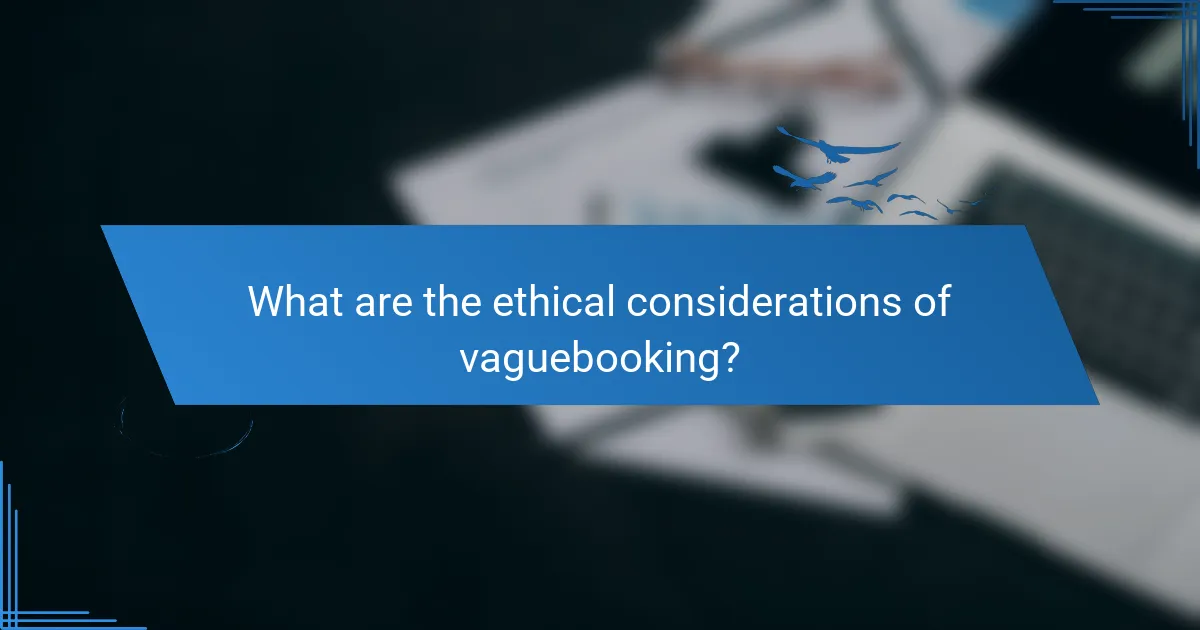
What are the ethical considerations of vaguebooking?
Vaguebooking raises several ethical concerns, primarily related to privacy and the impact on interpersonal relationships. Users must navigate the fine line between expressing emotions and respecting the boundaries of their audience.
Privacy concerns
Vaguebooking often involves sharing ambiguous or emotional content that can inadvertently expose personal information. This can lead to privacy violations, as friends or followers may speculate about the underlying issues, potentially revealing sensitive details.
To mitigate privacy risks, individuals should consider the audience of their posts. Limiting visibility to close friends or using privacy settings can help protect personal information while still allowing for emotional expression.
Impact on relationships
The indirect nature of vaguebooking can create misunderstandings among peers, as vague posts may lead to unnecessary speculation or concern. Friends may feel compelled to inquire about the post, which can strain relationships if the poster is not ready to share more details.
To maintain healthy relationships, it’s advisable to communicate directly with those involved rather than relying on vague posts. Clear communication can prevent misinterpretations and foster stronger connections among friends and family.
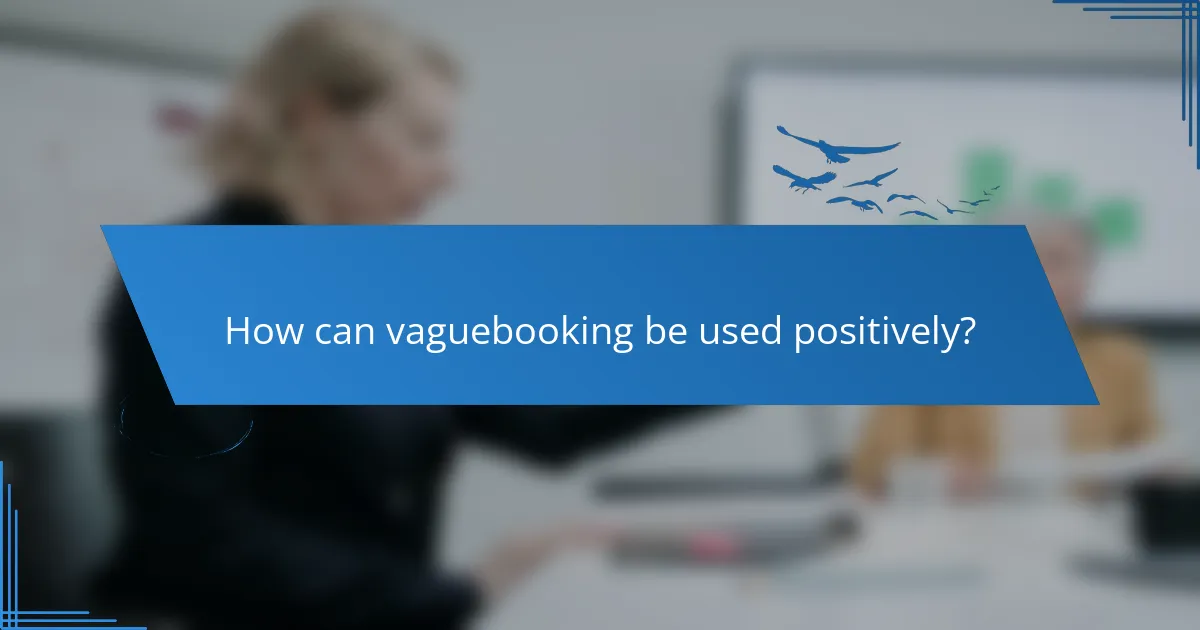
How can vaguebooking be used positively?
Vaguebooking can foster positive interactions by encouraging emotional expression and facilitating deeper conversations among peers. When used thoughtfully, it can create a supportive environment for discussing feelings and experiences without the pressure of direct communication.
Encouraging open discussions
Vaguebooking can serve as a catalyst for open discussions among friends and followers. By posting ambiguous statements, individuals may invite others to inquire about their feelings, leading to meaningful exchanges. This indirect approach can help those who might be hesitant to share their thoughts directly feel more comfortable engaging in dialogue.
To maximize this benefit, consider using phrases that hint at your emotions or thoughts without revealing everything. For instance, a post like “Feeling a bit off today” can prompt friends to check in, creating an opportunity for support and connection.
Promoting mental health awareness
Vaguebooking can also raise awareness about mental health issues by subtly addressing personal struggles. When individuals share their experiences indirectly, it can encourage others to reflect on their own mental health and seek help if needed. This shared vulnerability can foster a community of understanding and support.
To effectively promote mental health awareness through vaguebooking, use language that resonates with common feelings, such as “Sometimes the weight feels heavy.” This can open the door for discussions about mental health resources and coping strategies, helping to normalize these conversations among peers.
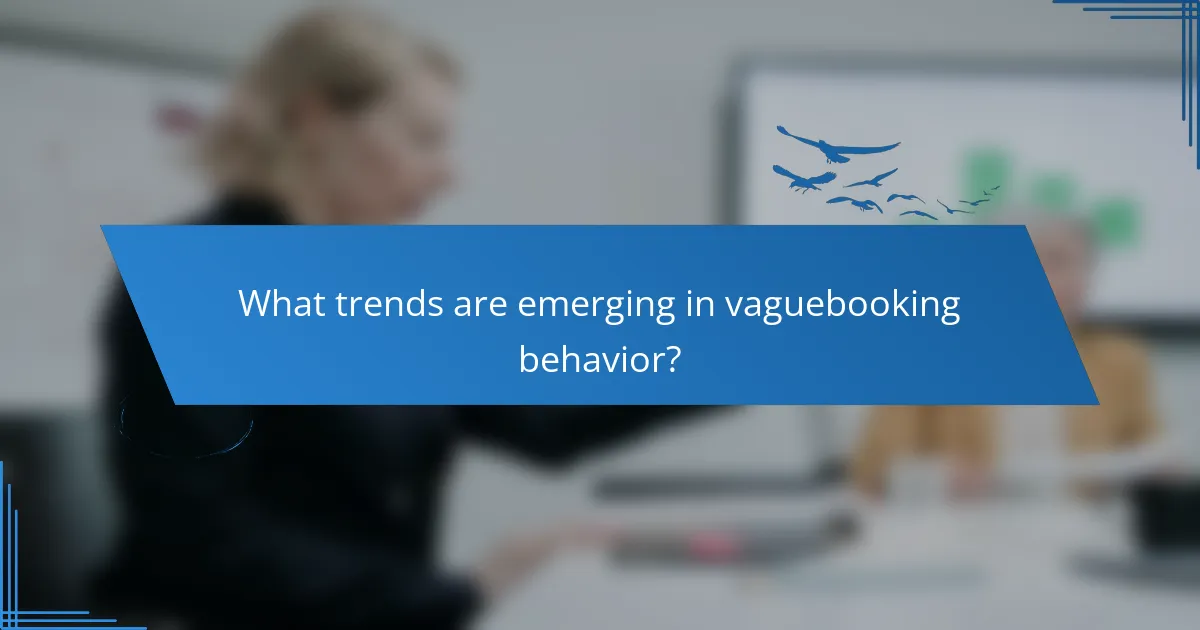
What trends are emerging in vaguebooking behavior?
Vaguebooking behavior is increasingly characterized by indirect communication, where users post ambiguous statements that hint at emotions or situations without providing clarity. This trend reflects a desire for emotional expression and peer interaction, often leading to speculation and engagement from friends and followers.
Increased Emotional Expression
Vaguebooking allows individuals to express their feelings without fully disclosing their circumstances. This indirect communication can serve as a coping mechanism, enabling users to share their emotional states while maintaining a level of privacy. For example, a post like “Some days are just too much” invites concern and support without detailing the specific issues at hand.
Peer Interaction and Engagement
Posts that are vague often prompt responses from friends, creating opportunities for interaction. This engagement can range from supportive comments to inquiries about the underlying issues. Users may find that vague posts generate more comments than straightforward updates, as friends feel compelled to ask for clarification or offer help.
Social Validation and Attention Seeking
Vaguebooking can also be a strategy for gaining social validation. By posting ambiguous messages, users may seek attention or affirmation from their peers, leveraging the curiosity it generates. This behavior can lead to a cycle where individuals feel compelled to post vague updates to maintain engagement and visibility within their social circles.
Potential Misinterpretations
While vaguebooking can foster connection, it also carries the risk of misinterpretation. Friends may read into posts differently, leading to misunderstandings or unnecessary concern. It is essential for users to consider how their vague expressions might be perceived and whether they truly convey the intended message.
